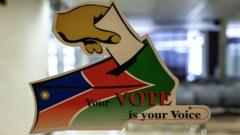This year has marked a significant shift in the political landscape of sub-Saharan Africa, where long-standing governing parties are facing unprecedented challenges at the ballot box. Namibia’s ruling party, Swapo, managed to maintain control in the recent presidential elections, with candidate Netumbo Nandi-Ndaitwah winning 57% of the vote to become the nation’s first female leader. However, the elections were marred by logistical glitches and allegations of irregularities, resulting in opposition parties refusing to recognize the outcome.
Voters Turn Against Longtime Rulers in Africa's Electoral Upset

Voters Turn Against Longtime Rulers in Africa's Electoral Upset
Recent elections in sub-Saharan Africa reveal a growing trend of voter discontent and political upheaval against ruling parties.
Across the continent, many established governments have suffered significant setbacks, particularly notable in Botswana and Mauritius. The Botswana Democratic Party (BDP), which held power since independence in 1966, faced a shocking defeat, retaining only four out of 69 parliamentary seats. In Mauritius, the ruling Alliance Lepep coalition was reduced to just two seats, while the opposition claimed a commanding 60-seat majority.
Senegal also experienced a notable political transformation, wherein opposition leader Bassirou Diomaye Faye triumphed in the presidential race after intense political strife and the release of jailed opposition leaders. In South Africa, the African National Congress (ANC) barely held onto power but fell below 50% of the vote for the first time since the end of apartheid.
Factors contributing to this wave of political change include intense public sentiment towards corruption, economic hardships, and a rise in organized opposition. High living costs due to inflation heightened dissatisfaction with the status quo, prompting a voter mobilization across various nations. The events in 2024 highlighted a regional trend towards increased democratic participation and opposition victories, showing a stark contrast to rising authoritarianism in other global areas.
As political dynamics shift, significant implications arise for future elections, with citizens showing a readiness to hold their leaders accountable. The outcomes across Africa this year illustrate a resilience for democracy that contradicts broader global declines, signaling a pivotal moment for multiparty politics on the continent. Scholars and analysts suggest the trajectory observed in 2024 may well carry into future elections, further impacting political landscapes in nations like Ghana and Malawi.
A growing chorus of election outcomes in favor of opposition voices may serve as an indication of an active citizenry eager for change in governance, amidst a worldwide atmosphere that often overlooks Africa's democratic resilience.
Senegal also experienced a notable political transformation, wherein opposition leader Bassirou Diomaye Faye triumphed in the presidential race after intense political strife and the release of jailed opposition leaders. In South Africa, the African National Congress (ANC) barely held onto power but fell below 50% of the vote for the first time since the end of apartheid.
Factors contributing to this wave of political change include intense public sentiment towards corruption, economic hardships, and a rise in organized opposition. High living costs due to inflation heightened dissatisfaction with the status quo, prompting a voter mobilization across various nations. The events in 2024 highlighted a regional trend towards increased democratic participation and opposition victories, showing a stark contrast to rising authoritarianism in other global areas.
As political dynamics shift, significant implications arise for future elections, with citizens showing a readiness to hold their leaders accountable. The outcomes across Africa this year illustrate a resilience for democracy that contradicts broader global declines, signaling a pivotal moment for multiparty politics on the continent. Scholars and analysts suggest the trajectory observed in 2024 may well carry into future elections, further impacting political landscapes in nations like Ghana and Malawi.
A growing chorus of election outcomes in favor of opposition voices may serve as an indication of an active citizenry eager for change in governance, amidst a worldwide atmosphere that often overlooks Africa's democratic resilience.




















